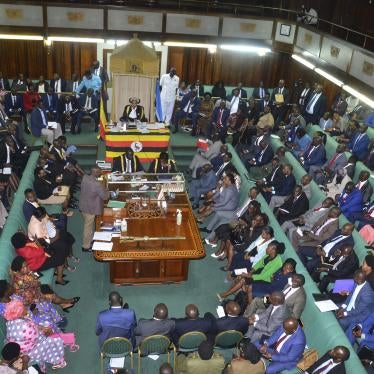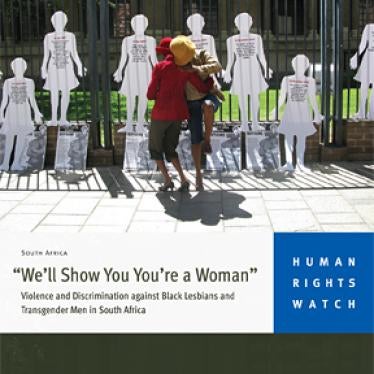Submission to the Department of Justice and Constitutional Development: National Task Team Secretariat
Draft National Intervention Strategy 2021 - 2025
A Human Rights, Survivor Focused and Victim Centric Approach in Countering Discrimination, Hate Crimes, Gender-Based Violence and Femicide Perpetrated against People on the Basis of their Sexual Orientation, Gender Identity, Gender Expression and Sex Characteristics
Human Rights Watch is an independent international non-governmental organization dedicated to protecting and defending human rights around the world, including those of lesbian, gay, bisexual, transgender and intersex (LGBTI) people. Our research and advocacy also focuses on women’s rights and the rights other marginalized groups such as children, prisoners, displaced persons, refugees and asylum seekers, ethnic and racial minorities, persons with disabilities, and migrant and domestic workers. Our work in South Africa has focused on violence and discrimination against Black lesbians and transgender women[1]; attacks on environmental rights defenders; failure to guarantee inclusive education for children with disabilities[2]; the need to decriminalise sex work[3] and xenophobic violence against non-South African nationals. In September 2020, Human Rights Watch documented the large scale and individual experiences of xenophobia, discrimination, and barriers experienced by non-South African nationals in the year following the launch of the National Action Plan to Combat Racism, Racial Discrimination, Xenophobia and Related Intolerance (NAP).
Human Rights Watch has also conducted extensive research and documented the negative impact of non-recognition of transgender, non-binary and intersex persons on official identity documents in various parts of the world.[4] Furthermore, we have extensively documented how children born with variations in their sex characteristics – sometimes called intersex variations – are often subjected to "normalizing" surgeries that are irreversible, risky, and medically unnecessary.[5] In March 2021, Human Rights Watch filed a submission with the Department of Home Affairs on the Draft Official Identity Management Policy affirming that the current system is inadequate because ‘[G]ender and sexual identity minorities are excluded because the current laws and policies do not cater for changes in the gender/sex attribute of the identity system.’[6]
Human Rights Watch, a member of the National Task Team (NTT), welcomes the opportunity to make this submission to the Secretariat of the NTT of the Department of Justice and Constitutional Development and supports the development of the draft National Intervention Strategy (NIS) that provides the framework to counter violence and discrimination based on sexual orientation, gender identity, gender expression and sex characteristics. Human Rights Watch supports the inclusion of Gender-Based Violence and Femicide National Strategic Plan (GBVF NSP) in the NIS as its sets out to provide a cohesive strategic framework to guide the national response to the GBVF crisis in South Africa.
In this context, Human Rights Watch urges the Department of Justice to incorporate the NAP adopted in March 2019 into the NIS to address challenges faced by African LGBT asylum seekers, refugees, and undocumented migrants. South Africa is a common destination for African LGBT people fleeing their countries of origin due to persecution on the basis of their sexual orientation, gender identity, and/or expression. Across the continent, discriminatory laws and hostile social attitudes lead many LGBT people to flee their countries of origin and travel to South Africa to seek asylum and to pursue a better, more secure life. In addition to the challenges LGBT African asylum seekers experience in the context of refugee status determination and refugee appeals board processes, they have to deal with racist, xenophobic and homophobic attitudes prevalent in South African society and experience the same kinds of social and economic marginalization they had hoped to escape in their home countries. South Africa’s Refugees Amendment Act, 2008 expressly includes persecution on the basis of sexual orientation as a ground for seeking asylum and regulates the filing and processing of asylum applications.
Among the actions the NAP identifies to be taken to combat xenophobia, are creating mechanisms to ensure foreign nationals receive services they are entitled to, facilitating their integration, and embracing a humane and dignified approach to managing migrants, refugees, and asylum seekers. South Africa has ratified several treaties on issues of international refugee and human rights law, most notably the 1951 United Nations Refugee Convention and the Convention Governing the Specific Aspects of Refugee Problems in Africa. The latter expands the 1951 Refugee Convention’s narrow “well-founded fear of being persecuted” standard by including other grounds for refugee status, including flight across borders caused by “external aggression, occupation, foreign domination, or events seriously disturbing public order in either part or the whole of his country of origin or nationality.” The African Charter on Human and Peoples' Rights (Banjul Charter), to which South Africa is also a party, guarantees the rights of every individual, “when persecuted, to seek and obtain asylum in other countries in accordance with laws of those countries and international conventions.”
Underlying the various international refugee and human rights conventions are the principles of non-discrimination and dignity, core tenets of South Africa’s constitutional democracy. South Africa’s 1996 Constitution guarantees fundamental rights to all individuals, including refugees and asylum seekers and it is in this respect that Human Rights Watch urges the Secretariat of the NTT to ensure inclusion and protection of African LGBT asylum seekers in the NIS.
Regards,
Graeme Reid
Director
LGBT Rights Program
Human Rights Watch
[1] https://www.hrw.org/report/2011/12/05/well-show-you-youre-woman/violence-and-discrimination-against-black-lesbians-and
[2] https://www.hrw.org/report/2015/08/18/complicit-exclusion/south-africas-failure-guarantee-inclusive-education-children
[4] See for instance https://www.hrw.org/news/2020/09/08/transgender-third-gender-no-gender-part-i and https://www.hrw.org/news/2020/09/08/transgender-third-gender-no-gender-part-ii
[5] https://www.hrw.org/report/2017/07/25/i-want-be-nature-made-me/medically-unnecessary-surgeries-intersex-children-us
[6] Draft Policy on Official Identity Management, pg 16







